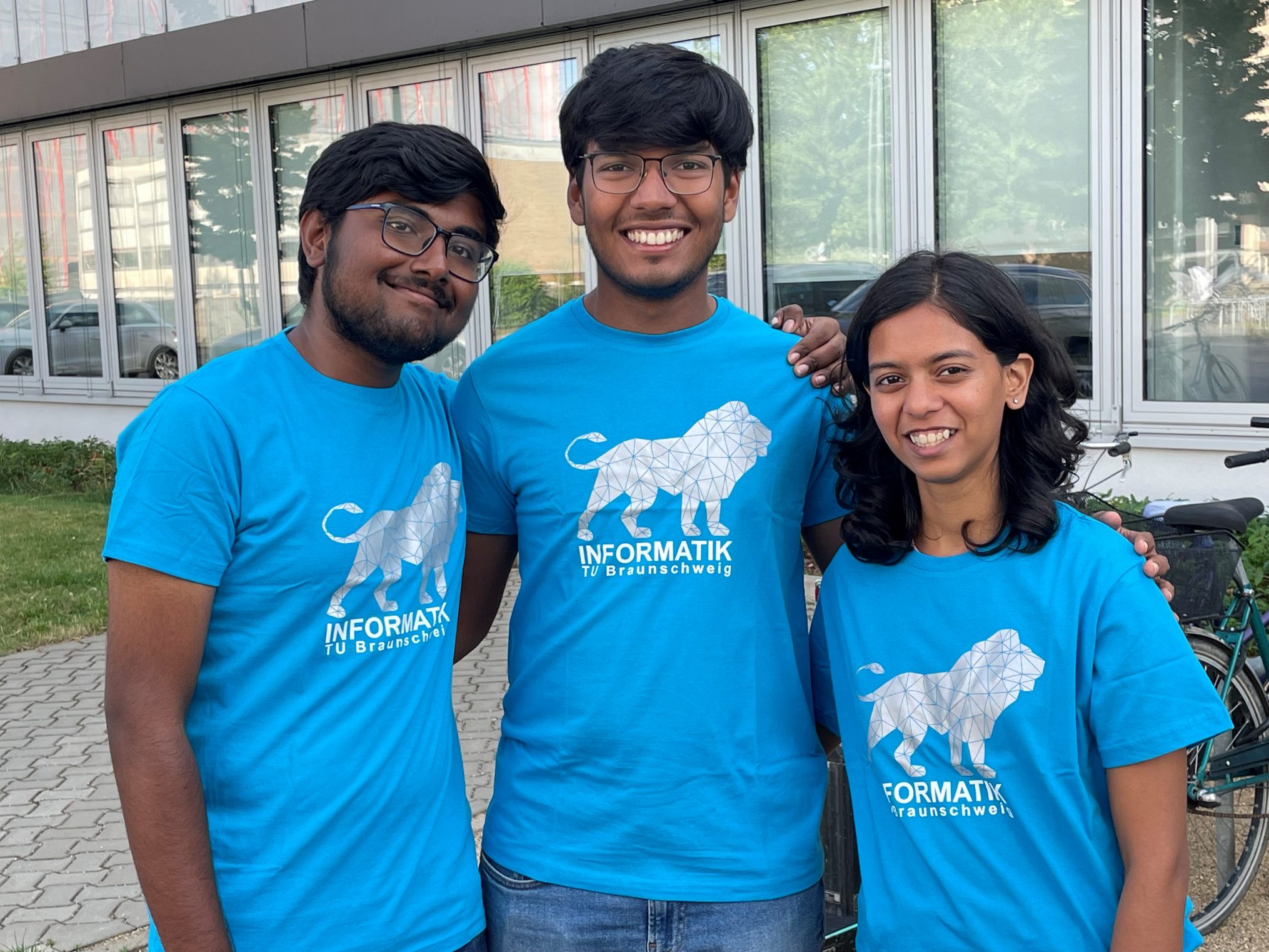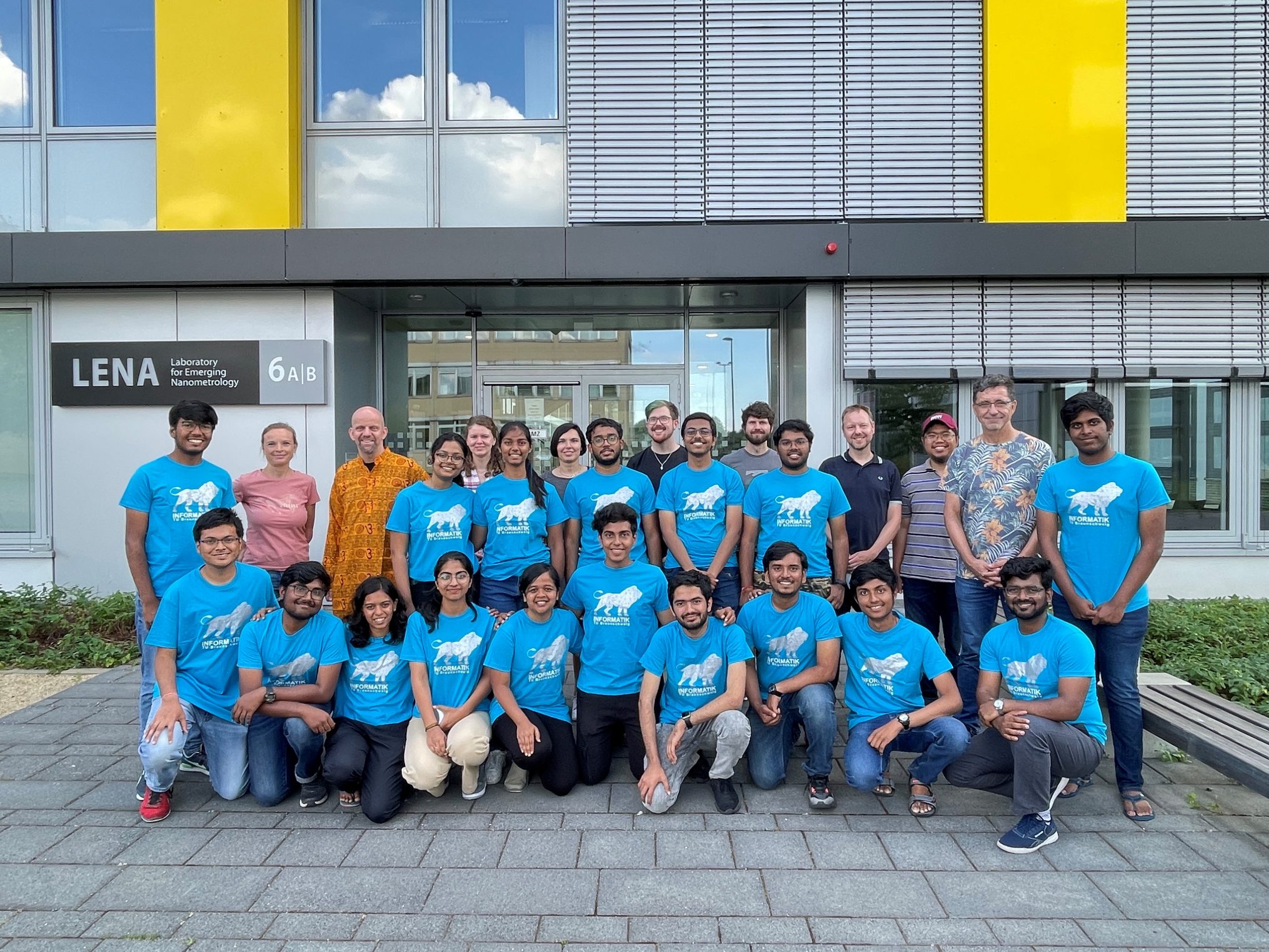Student exchange in the spirit of Ganesha Outstanding students from Bombay as guests at TU Braunschweig
For two and a half months, 17 students from the Indian Institute of Technology Bombay (IIT Bombay) were guests at TU Braunschweig. The cooperation with the Indian elite university, which was initiated by the Institute for Operating Systems and Computer Networks, has already existed since 2011. The partnership between the universities is sealed by several cooperation agreements; the fact that seven institutes from two faculties and the LENA research center were involved in this years exchange, shows how firmly it is meanwhile anchored within TU Braunschweig. In mid-July, the students traveled back to India with plenty of new impressions and experiences.

Dhananjay Raman, Mridul Agarwal, Rohinee Joshi. Bildnachweis: Sándor Fekete/TU Braunschweig
Professor Sándor Fekete, initiator and coordinator of the cooperation, is very pleased about the positive development:
“The fact that we were able to welcome 17 students from IIT Bombay here this year shows that we have built up a good reputation. This is also supported by the fact that we received 400 applications, all from outstanding students. The TU9 membership of TU Braunschweig plays an important role in this. But the students also know that we are very committed to them and remove as many obstacles as possible for them – be it on a bureaucratic or personal level.”
According to Fekete, the changed visa regulations in particular make it more difficult for students to enter Germany. Once they are in Braunschweig, they have to deal with other bureaucratic issues, such as health insurance for the duration of their stay. “Many employees in the participating institutes, in the International House and in the Studierendenwerk are very committed to helping the students from India,” Fekete emphasizes. “This is very much in the spirit of the elephant god Ganesha, who is seen in Hindu beliefs as the remover of obstacles,” he explains. A small “Ganesha” statue can also be found in Fekete’s office – a former research intern from IIT Bombay gave it to him as a gesture of gratitude for his efforts.
High standards enrich exchange
During their time in Braunschweig, the Indian students usually gain their first practical research experience. They not only learn how to work together with professors and other researchers, but also how to deal with successes and failures in their research work. It is not uncommon for outstanding publications to emerge after the stay, Fekete reports.
The fact that the level of the Indian students is so high is due to a tough selection process: Admission to elite universities in India is subject to a strict selection process. Out of approximately 1.5 million applicants, only around 10,000 are admitted to study at an Indian Institute of Technology. Thus, only very few applicants make it to the particularly prestigious IIT Bombay. “Of course, the students in our degree programmes also benefit from this high level of the exchange students, because there is a lively exchange. In addition to the academic background, the intercultural aspect is also very valuable for both sides,” says Fekete.
Professor Andreas Waag, who welcomed research interns from IIT Bombay to his institute for the first time this year, is also impressed by the level at which the exchange students perform:
“At LENA, we work not only on semiconductor material development and chip processing, but also on system integration. It is precisely there, at the interface of hardware and software, that the students have made interesting and relevant contributions. It is impressive in what a short time presentable results have been achieved.”
“This experience will always have a special place in my heart”
The students who were guests at TU Braunschweig this summer also draw a positive conclusion. “I really liked the work ethic and the atmosphere at TU Braunschweig. In particular, I really liked the fact that I could literally approach anyone and ask anyone questions,” says Dhananjay Raman. For Mridul Agarwal, who made his decision for Braunschweig based on the positive reports of his predecessors, the exchange with renowned scientists was also a great added value.

Joint final evening in mid-July before the students started their journey home to India. Photo credit: Thorben Dammeyer/TU Braunschweig
Research intern Rohinee Joshi would like to pass on some of her experiences to other students in the future: “I am very grateful for everything that TU Braunschweig has done for us. We learned from Professor Fekete that the best way to say thank you is to give other people opportunities to experience something like this as well. I definitely want to put that into practice. This internship experience will always have a special place in my heart.”
Next summer, students from IIT Bombay will again be welcomed to TU Braunschweig. For this purpose, activities are already underway to continue the cooperation – also in other subject areas. “Our goal is to further expand the cooperation on a broad university level. To this end, we have already received offers from the Indian side for cooperation at the administrative level beyond the cooperation agreements,” says Sándor Fekete, looking ahead.
